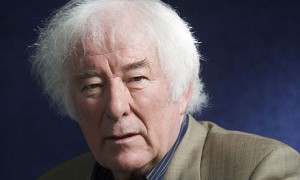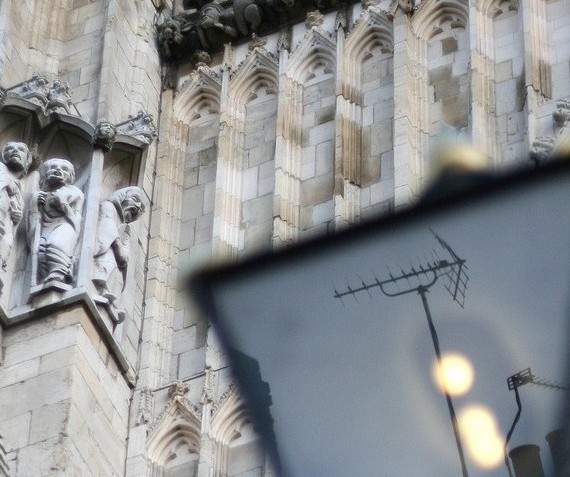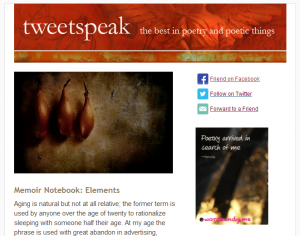Editor’s Note: Three days ago, we ran this post in celebration of the life and words of Seamus Heaney. Today, August 30, 2013, we say a sorrowful goodbye to the poet who so many loved (or will, we hope, still come to love).
As I seek to better appreciate poets and poems, I’ve been reading Seamus Heaney’s Opened Ground: Selected Poems 1966-1996 (1999), and simultaneously reading Dennis O’Driscoll’s Stepping Stones: Interviews with Seamus Heaney (2010). This wasn’t actually planned, but both books had been sitting on my shelf and it seemed to make sense to read them together.
The Interviews
What is particularly helpful is that O’Driscoll has arranged the interviews to cover some introductory subjects and then each one of Heaney’s collections, and Heaney’s volume pulls selected poems from the volumes through 1996. So I can read the poems and then read the interview covering the volume the poems appeared in.
The interviews occurred over a period of years. Most were done by letter and email. Two were actually broadcast programs taped and later transcribed. All of them describe what influenced Heaney, how he put the collections together, and what all of this work came to mean over time.
The Poetry
I first started reading Heaney’s poetry by backing into it. I knew he had won the Nobel Prize for Literature in 1995, but I didn’t read his work until I picked by his translation of Beowulf (2001) in a bookstore in New Orleans. I hadn’t read Beowulf since college, and I was quickly drawn into Heaney’s translation of the story, reading the first ten pages right there in the bookstore.

The interviews have the benefit of hindsight, but that’s generally true of all biographic works. O’Driscoll asks questions about each of Heaney’s poetry volumes, the poets and poems he knew, his upbringing in Northern Ireland and the influence it had on his work—all the questions one would hope would be asked and more.
Small Things
Heaney’s answers are looking backward, but even the passage of time can’t dim the excitement of receiving copies of a first poetry collection, of the understanding of what Heaney was trying to convey in a poem like “Death of a Naturalist, ” or how a poem like “The Diviner” wasn’t supposed to be in the first collection but Heaney happened to have it in his pocket while on a visit to the publisher.
Those are small things, but they are telling, and they are the events and accidents that readers can identify with, those seemingly inconsequential things like sticking a poem in your pocket and events come together so that it’s included in a volume.
Of course those small things, those little details, are what make Heaney’s poetry so accessible.
“New Formalism” Poets and Poems
Critics say Heaney falls in the “new formalism” wing of contemporary poetry, a wing that includes Dana Gioia, Mark Jarman, and Derek Walcott, among others. Regardless of the critics’ classification, I find Heaney to be an original, developing out his Catholic (and Irish Nationalist) roots but eventually transcending them. The past, however, is always with him.
Reading his poems and O’Driscoll’s interviews at the same time is an intriguing journey in poetry, memory, and often delight.
The Diviner
Cut from the green hedge a forked hazel stick
That he held tight by the arms of the V:
Circling the terrain, hunting the pluck
Of water, nervous, but professionally
Unfussed. The pluck came sharp as a sting.
The rod jerked with precise convulsions.
Spring water suddenly broadcasting
Through a green hazel its secret stations.
The bystanders would ask to have a try.
He handed them the rod without a word.
It lay dead in their grasp till, nonchalantly,
He gripped expectant wrists. The hazel stirred.
Related:
Heaney’s lecture for the 1995 Nobel Prize for Literature ceremony.
Browse more poets and poems featured here at Tweetspeak Poetry.
Image by electropod. Sourced via Flickr. Post by Glynn Young, author of the novels Dancing Priest and A Light Shining.
___________________________
Subscribe to our free weekly newsletter.
We’ll make your Saturdays happy with a regular delivery of the best in poetry and poetic things.
Need a little convincing? Enjoy a free sample.
- Poets and Poems: Sandra Marchetti and “Diorama” - April 24, 2025
- Poets and Poems: Christina Cook and “Roaming the Labyrinth” - April 22, 2025
- Longfellow’s “Paul Revere’s Ride”: Creating a National Legend - April 17, 2025


Mary Sayler says
Glynn, I appreciate your discussing poetry and literature and pray that other members of our Christian Poets & Writers group on Facebook will be drawn to discovering their potential as Christian artists. Writing well helps us to use our God-given gifts effectively and increases the likelihood of our placing poems and writings almost anywhere that accepts well-written works.
Nancy Franson says
A small thing–I just so happened to receive a copy of Heaney’s Opened Ground.My family housed a graduate student intern this summer, and we discussed Operation Poetry Dare around the dinner table. While culling out some of his books from his years as an undergraduate English major, he asked if I was interested in a couple of books of Irish poetry.
So now I have the beginnings of a poetry collection. And this is one of the volumes. What are the odds?
Maureen Doallas says
Thank you for mentioning the O’Driscoll interviews, Glynn. I’ll put his book on my list for next purchases. Heaney has written some marvelous poems.
Hampgal says
When I received the news about S.H. I cried on & off for hours. Many of his poems and writing about poetry helped me cope for 9 years as caregiver to a parent with Alzheimer’s Disease. Solas síoraí to both Mom & S.H.